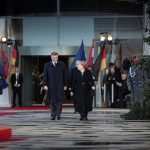An important meeting coming up for Croatian Prime Minister.
Croatian Prime Minister Andrej Plenković will travel to Berlin next Monday, where he will meet with German Chancellor Angela Merkel, reports Jutarnji List on December 8, 2016.
Although the government has not announced the official schedule for the visit, and has not even confirmed that the Prime Minister will indeed travel to Germany, the visit has been confirmed by unofficial sources, who also speculated about possible topics for the discussion.
The future of the European Union after the United Kingdom started the process of leaving the EU, as well as the situation in Italy, which in a recent referendum overwhelmingly rejected constitutional changes proposed by Italian Prime Minister Matteo Renzi, will certainly be among the topics of the meeting. Another certain topic is how to improve bilateral relations between Germany and Croatia, with a focus on German investments in Croatia and Croatian exports to the German market.
Prime Minister Plenković and Chancellor Merkel will also discuss the stabilization of the region, including Croatian view of the situation in Bosnia and Herzegovina and Serbia, countries which Croatia strongly supports on their road to the European Union. One of the topics, according to sources, will be challenges brought by migrant crisis, as well as the issue of international terrorism.
“The visit of Prime Minister Plenković to Berlin comes at the right time for him”, said one high-ranking HDZ official. “It should be noted that Merkel received President Kolinda Grabar-Kitarović within a month after her inauguration, and now she is doing the same with Andrej Plenković, which sends a clear message.”
The source says that Plenković, as a former member of European Parliament, is well-known in EU institutions and that he is coming to Germany as a clearly defined politician of European orientation and a long diplomatic career.
“Another important fact is that Croatia has both the President and the Prime Minister of the same ideology, which is very close to modern conservatism advocated by German Chancellor Angela Merkel”, said the source.








